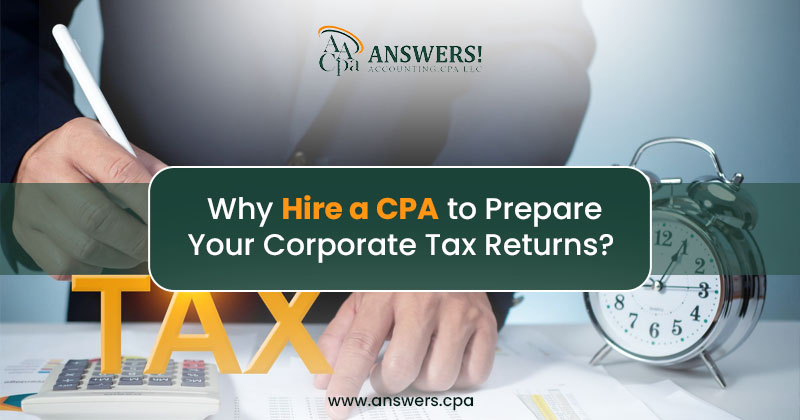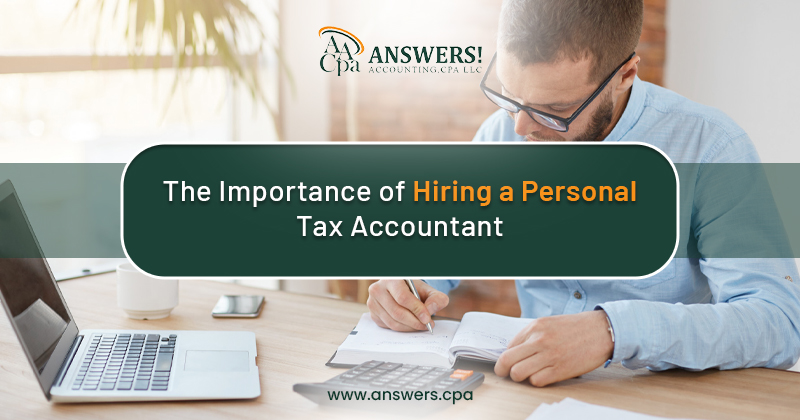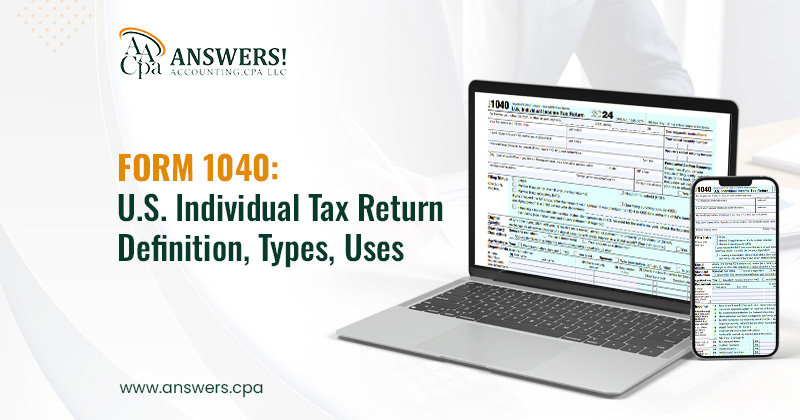Reasons to Hire a CPA to Do Your Business Taxes
Running a business is hard work. From managing your team to growing sales, there is always something to do. But one of the most important tasks is filing your corporate tax return. This job can be tricky and stressful. That’s why hiring a Certified Public Accountant (CPA) is often the smartest move. In this blog, we’ll explain what a CPA does, why they are helpful, and how they can make tax time much easier for your business.
What Is a CPA?
A CPA is a licensed accountant who has passed a special exam and met other state requirements. They are experts in taxes, accounting, and financial laws. CPAs must also take continuing education courses every year to stay up to date with tax rules and laws. Because of this, CPAs are trusted professionals who can help businesses stay organized, save money, and avoid legal trouble.
Corporate Taxes Are Complex
Filing personal taxes is already a challenge for many people. But corporate taxes are even more complicated. Businesses have different rules, forms, and deadlines. There are also many ways to lower your tax bill, but you need to know what you’re doing.
Here are some things businesses have to deal with when filing taxes:
- • Income from sales and services
- • Payroll taxes
- • Deductions for business expenses
- • Depreciation of equipment
- • Tax credits
- • Filing at the state and federal level
If you don’t understand these areas well, you could make mistakes that cost your business money or lead to penalties. A CPA knows how to handle all of this.
Benefit 1: Accuracy and Compliance
The most important reason to hire a CPA is accuracy. CPAs know how to prepare tax returns the right way. They make sure your numbers are correct and all forms are filled out properly. This helps your business stay in compliance with the IRS and your state’s tax department.
When you file incorrect or incomplete tax returns, the IRS can send you a notice, charge fees, or even audit your business. CPAs know the rules and work hard to avoid these problems. Their work gives you peace of mind.
Benefit 2: Save Time and Reduce Stress
Preparing your corporate tax return takes a lot of time, especially if you try to do it yourself. You have to gather receipts, check financial records, and understand all the forms and rules.
If you’re a busy business owner, that’s time you don’t have. A CPA can handle all the tax work while you focus on running your business. This takes the stress off your shoulders and lets you concentrate on what matters most: your customers and employees.
Benefit 3: Maximize Deductions and Credits
Businesses can save money through tax deductions and credits. A deduction is a business cost you can subtract from your income. This lowers the amount of tax you owe. A credit is even better—it reduces your tax bill directly.
Here are some examples of tax deductions:
- • Office rent
- • Employee salaries
- • Business travel
- • Equipment purchases
- • Marketing and advertising
CPAs know which deductions and credits you qualify for. They also know how to document everything properly, so you can take full advantage without getting in trouble later. Many business owners miss out on savings simply because they don’t know what’s allowed. A CPA makes sure you get every dollar you deserve.
Benefit 4: Help with Audits
An audit is when the IRS checks your tax return to make sure everything is correct. If your business gets audited, it can be stressful. You might be asked to show receipts, bank statements, or other records.
But if you hired a CPA, you’re in good hands. A CPA can talk to the IRS for you, answer questions, and provide all the paperwork. They know how audits work and can guide you through the process. Having a CPA on your side makes audits much less scary.
Benefit 5: Tax Planning for the Future
Tax preparation isn’t just about filing forms once a year. It’s also about planning ahead. A CPA can help you make smart decisions all year long that lower your future tax bills.
For example, they can help you:
- • Decide the best time to buy equipment
- • Choose the right business structure (like LLC or corporation)
- • Set up retirement plans for you and your employees
- • Estimate how much tax you’ll owe each quarter
This kind of planning helps you avoid surprises and keep more of your profits.
Benefit 6: Support During Business Changes
Running a business means going through changes. Maybe you want to grow your team, open a new location, or even sell your company. A CPA can help with these changes.
For example:
- • If you want to hire more staff, a CPA can explain how that affects payroll taxes.
- • If you want to expand into another state, a CPA can help you understand tax rules there.
- • If you want to sell your business, a CPA can help with the financial reports and tax planning.
Having a CPA means you don’t have to figure everything out alone. They’re a partner you can count on.
Benefit 7: Reduce the Risk of Penalties
Mistakes on your tax return can lead to penalties and interest. These costs can add up fast and hurt your cash flow. The IRS may charge you if:
- • You file your return late
- • You don’t pay the right amount of tax
- • You make math errors
- • You forgot to include important information
A CPA reduces these risks. They double-check your return and make sure everything is done correctly and on time. Their careful work helps protect your business.
Benefit 8: Customized Advice
Every business is different. Some are big, some are small. Some are in tech, others in retail or food service. A CPA gives advice that fits your specific business and goals.
They take the time to understand:
- • How your business works
- • What your goals are
- • What challenges do you face
Then they give advice that’s right for you. This kind of personal help can make a big difference.
Benefit 9: Professional Tools and Software
CPAs use top-level accounting software and tools that most business owners don’t have. These tools make it easier to:
- • Organize receipts
- • Track income and expenses
- • Create financial reports
- • File tax forms electronically
With a CPA, your tax return will be prepared using the best resources, which means fewer errors and faster results.
Benefit 10: Year-Round Support
A CPA isn’t just for tax season. They’re available all year to help with any financial questions or problems you have. This means you don’t have to wait until April to get help.
Need to apply for a business loan? Your CPA can help with your financial statements. Want to know if you can afford a new hire? Your CPA can help with budgeting. Have a question about sales tax? Ask your CPA.
They are like your business's financial coach, helping you stay on track every month.
What to Look for in a CPA
Not all CPAs are the same. When choosing one, look for someone who:
- • Has experience with your type of business
- • Communicates clearly and listens well
- • Is licensed and in good standing
- • Offers services that meet your needs
- • Has good reviews or references
You should also ask about their fees and how they bill. Some charge by the hour, while others charge a flat fee. Make sure you understand the costs upfront.
Make a Smart Choice for Your Business
Hiring a CPA to prepare your corporate tax returns is a smart move. They can save you time, money, and stress. They know how to follow the rules, find deductions, and help you plan for the future. Most importantly, they give you peace of mind.
Don’t take risks with your business’s taxes. A mistake today can cost you tomorrow. By working with a CPA, you can feel confident that your tax return is done right.
Need help with your corporate taxes? Global FPO has a team of experienced CPAs ready to support your business. Contact us today to learn how we can help you file your taxes the right way and plan for long-term success.
FAQ's
1. What is the difference between a CPA and a regular tax preparer?
A CPA is a licensed professional who has passed a rigorous exam and meets strict state requirements. They have more education, training, and experience than a basic tax preparer and can represent you before the IRS during an audit.
2. Can a CPA help my business save money on taxes?
Yes, a CPA can help identify deductions and credits your business qualifies for, which can lower your tax bill. They also help with tax planning strategies that reduce future tax costs.
3. Is it worth hiring a CPA for a small business?
Absolutely. Small businesses often benefit the most from expert advice. A CPA can help avoid costly mistakes, manage cash flow, and keep your finances on track, even if your business is just starting out.
4. What documents should I provide to my CPA during tax season?
You should give your CPA income statements, expense reports, payroll records, previous tax returns, bank statements, and any documents related to business purchases, assets, or debts.
5. How often should I meet with my CPA?
While most people meet with their CPA during tax season, it’s smart to check in quarterly or at least twice a year for financial reviews, tax planning, and help with business decisions.







